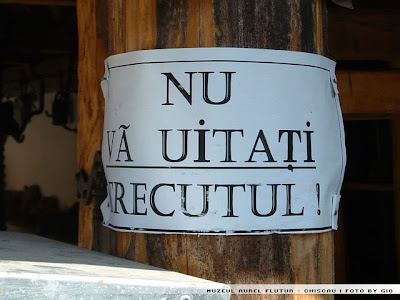"Do not forget your past!" it seems this is the motto who guided a common Romanian family through their lifetime. The family Flutur, Aurel and his wife Lucreția, simple but warm hearted peasants of Chișcău leave behind them a valuable cultural heritage, one of the largest private collection of ethnography in the country which does credits to the community and site host. The village , that crosses Crăiasa (Prices fairy) hill, is located in the picturesque depression of Beiuș, in the foothill of Bihor Mountains in the south eastern part of Bihor county (west side of Romania). Aurel Flutur's passion of collecting objects began in 1968. Nowadays, the collection has over 2500 objects and it is arranged in a peasant farm built in the second half of the twentieth century, that was acquired by the Flutur family in 1981.
There, we have the opportunity to find occupations practiced in rural areas through agricultural machines, tools, presses for grapes, pin, hive, leathers shoemakers, coopers, mining. There are also presented industrial objects, the master piece being a locomobile, dating from 1907.
There are also illustrated home occupations (instruments used in cooking, wooden spoons, various objects used in textiles processing, and clothing manufacturing, distaff, scrubbers, combs, hemp, loom) , folk costumes.
 |
The exhibition space includes various rooms that reconstructs traditional interiors from the area , an old classroom where there is a wooden school bad made by Flutur's father, the first collected object by him.
A room is dedicated to the memory of the family where there are exhibited vintage photos with family ancestors, objects belonging to Ioan Gabor the outlaw (1860-1913), Lucreția's grandfather ... one of the last outlaws of Bihor Mountains, whom the olders called Oneață.
The exhibition also present some aspects of religious beliefs and people's lives from the village, a stone altar table dating from 1807, trinitys, wooden crosses and a small collection of history composed of lances and spears from the Middle Ages. Also military objects of modern and contemporary epoque: helmets, suitcases, prosthesis for the war.
The trail ends with a large hall which hosts a number of heterogenous objects, bells, old phones sets and typewritting machines, abacus, sewing machines, including a wooden one, sledges, decoratives yokes, plows, mills, mobile bread oven, a gypsy wagon and many more...
So, follow the believes of Flutur's family: "Do not forgot your past!"









Niciun comentariu:
Trimiteți un comentariu